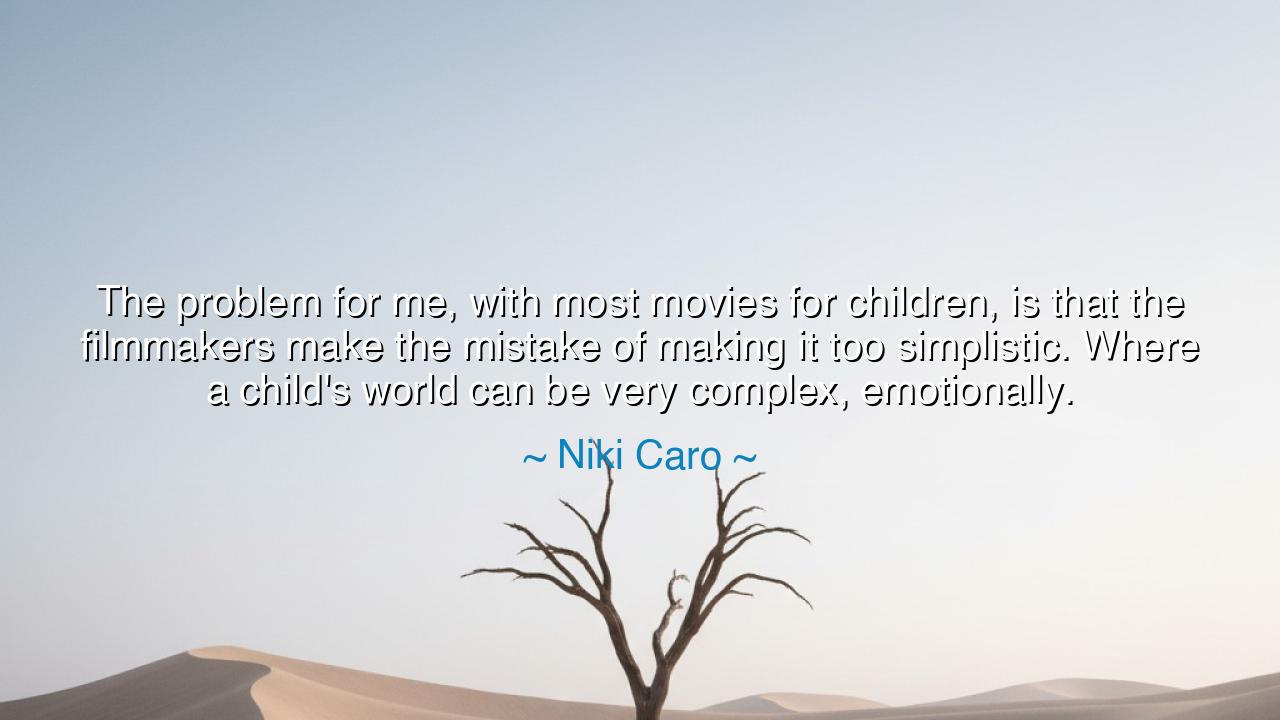
The problem for me, with most movies for children, is that the
The problem for me, with most movies for children, is that the filmmakers make the mistake of making it too simplistic. Where a child's world can be very complex, emotionally.






Ah, the wisdom of Niki Caro, who, with sharp insight, calls attention to the often misunderstood complexity of the world through a child's eyes. "The problem for me, with most movies for children, is that the filmmakers make the mistake of making it too simplistic. Where a child's world can be very complex, emotionally." In these words, Caro speaks not just to the nature of children's films, but to the deeper, more profound truth about the emotional world of children—a world often underestimated, simplified, or glossed over. Children, she reminds us, live not in a realm of innocence untouched by complexity, but in a world rich with emotion, confusion, joy, and pain. It is through this lens that we must view their stories, not as simple fables, but as deep, intricate journeys that reflect the fullness of the human condition.
In the ancient world, there was a deep recognition of the complexity of the child’s emotional landscape. The Greek philosophers, particularly Plato and Aristotle, understood that the young were not to be treated as passive vessels to be filled with simple truths, but as individuals capable of profound thought and feeling. Plato’s allegory of the cave taught that all people, no matter their age, must navigate the shadows of misunderstanding before seeing the truth. The child, then, is not just a blank slate; their mind is already full of wonder, struggle, and complexity. To deny them the depth of the world is to deny them the chance to grow fully into the wisdom they are destined to attain.
Caro’s observation echoes this understanding. When filmmakers or storytellers reduce the world of children to mere simplicity, they rob them of the chance to engage with the full spectrum of human emotions. In the same way that Homer’s epics, though told through the lens of gods and heroes, always reflect the inner turmoil and complexities of the human soul, so too must the stories told to children reflect the emotional depth they experience. The child who is portrayed as carefree, unburdened by the world, is not the whole child. The child who encounters the depths of loss, the joy of discovery, and the confusion of new experiences is the child who begins to understand the complexity of life. Caro calls us to honor that complexity, to tell stories that speak to the fullness of a child’s emotional world.
Consider the great storytellers of the ancient world—Aesop, with his fables, and Homer, with his epics. They did not tell simple stories, but stories that contained within them moral depth and emotional complexity. Aesop’s fables often carried dark undertones of human nature, where even the simplest of animals could teach lessons about greed, pride, and wisdom. Homer’s "Iliad", though an epic of war and heroism, was also a meditation on fate, honor, and the fragility of life. These tales spoke to children and adults alike, not because they were simple, but because they touched on the complexities of the human heart. The ancient storytellers knew that children’s minds, like adults, needed to engage with life’s challenges, not just its comforts.
Caro’s words reflect a truth that is often ignored in modern storytelling: children’s stories must not be mere escapism or simplified narratives. They must be rich with emotion and reflect the true complexity of human life. Children, after all, are not sheltered from the hardships of the world. They feel deeply, even if they lack the words to express it. Their world is filled with confusing emotions—fear, love, loss, and joy—and it is in these emotions that they find the raw material for understanding the world. Just as the heroes of myth did not learn through simple victories but through the challenges they faced, so too must children learn through the complexities of the stories they encounter.
The lesson is clear: honor the emotional depth of the young. To treat children’s emotions as simplistic is to deny them the full spectrum of human experience. Just as the great teachers of ancient times believed that wisdom came not from being shielded from hardship, but from engaging with the complexities of life, so must we teach our children through stories that reflect the real world—not in its perfection, but in its beautiful, messy complexity. Like Caro’s filmmaking, which embraces the emotional depth of its subjects, we too must approach the world of children with the belief that they are capable of understanding and feeling deeply.
Thus, the call to action is clear: respect the emotional world of children and create stories that reflect the fullness of their experience. Do not simplify, do not reduce, but embrace the complexity of their feelings, their challenges, and their joys. Teach through stories that reflect the richness of life, for in doing so, we allow children not only to understand the world around them but to find their own place within it. Just as the ancient myths helped shape the values and wisdom of generations, so too can our stories shape the hearts and minds of future generations by acknowledging their emotional depth.






AAdministratorAdministrator
Welcome, honored guests. Please leave a comment, we will respond soon